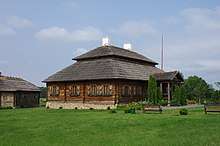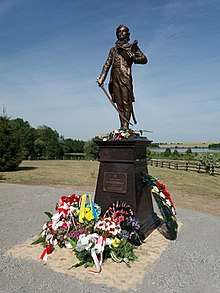Mieračoŭščyna
Mieračoŭščyna (Belarusian: Мерачоўшчына, Polish: Mereczowszczyzna) is a former manor near Kosava in Ivatsevichy District, Brest Region, in present-day Belarus. It is best known as a birthplace of Tadeusz Kościuszko. There is a Kościuszko museum in the reconstructed manor house of his birth.


History
In the first half of the 18th century, the folwark of Mereczowszczyzna belonged to the Sapieha family, and until the Partitions of Poland, was part of the Grand Duchy of Lithuania’s Brest Litovsk Voivodeship. In 1733, the village became property of Ludwik Tadeusz Kosciuszko, who lived here until 1764. On February 4, 1746, Tadeusz Kosciuszko was born here, in a manor house. After the third partition of Poland (1795), the village came under control of the Russian Empire, where it remained until 1916. From 1918 to 1939, it belonged to the Second Polish Republic. In September 1939, it was occupied by the Soviet Union during the Soviet invasion of Poland in World War II, and annexed to Byelorussian Soviet Socialist Republic. In 1941, it was occupied by Nazi Germany. In 1942, the house in which Kosciuszko was born and spent the first 12 years of his life was burned down by Soviet partisans. After the war, the village remained in the Soviet Union.
Kościuszko museum
In 2003, with financial support of the U.S. Embassy in Minsk, reconstruction of the house was started. Since several photos and drawings of the complex were preserved, the work was completed in a year. The house, based on the 18th century foundations, was opened for the public in 2004. Next to Kosciuszko’s house a large rock was placed with a plaque that reads in Belarusian: “Here, in Merechevschina, Andrej Tadeusz Bonawentura Kasciuszka was born. He was the great son of the Belarusian land, who became a hero of Poland and USA, as well as Honorary Citizen of France”.[1]
References
- "Mereczowszczyzna. W ojczyźnie Tadeusza Kościuszki - Otwarty Przewodnik Krajoznawczy". Krajoznawcy.info.pl. 2013-10-10. Retrieved 2013-10-15.
| Wikimedia Commons has media related to Mieračoŭščyna. |